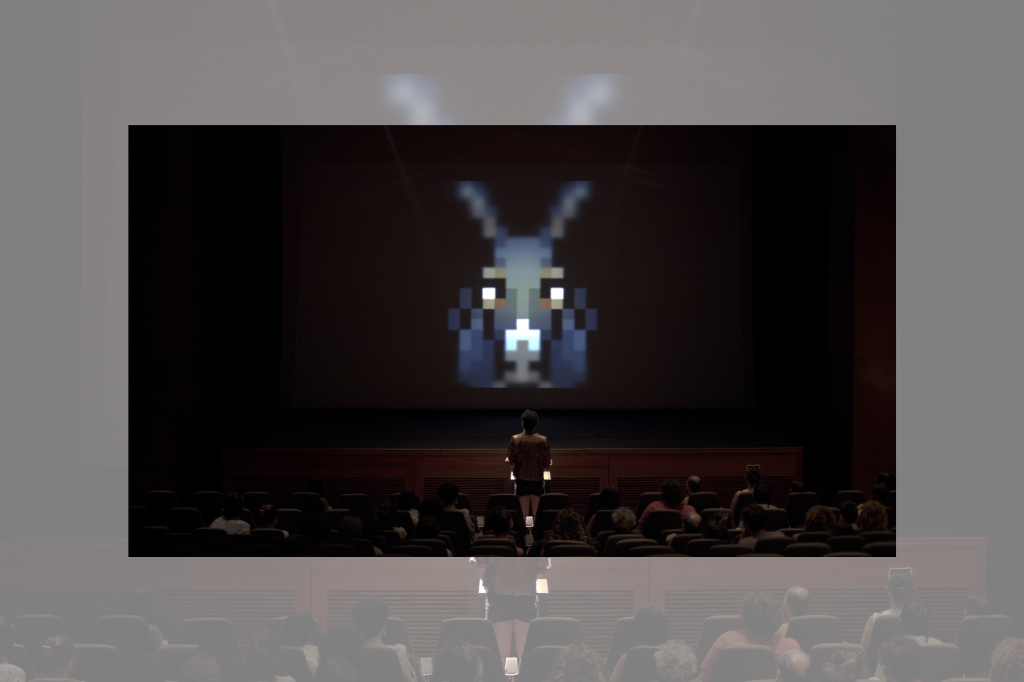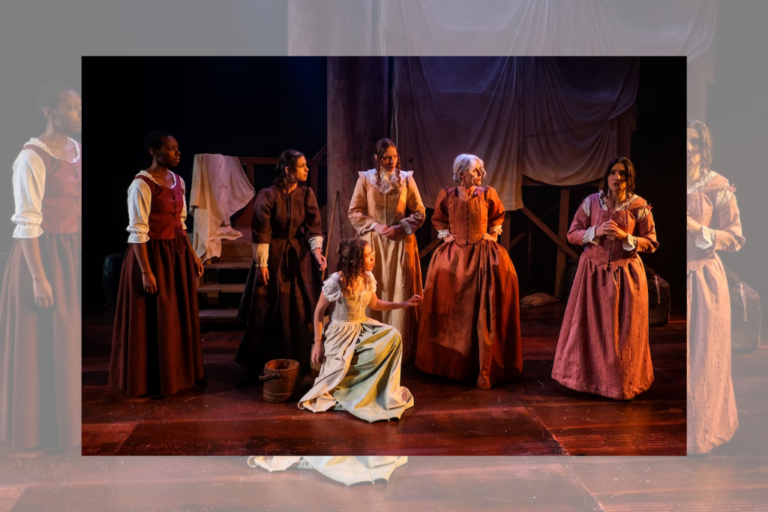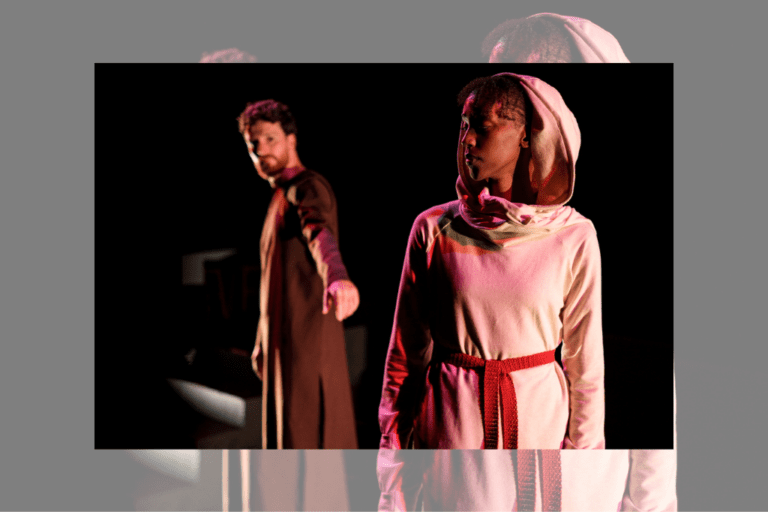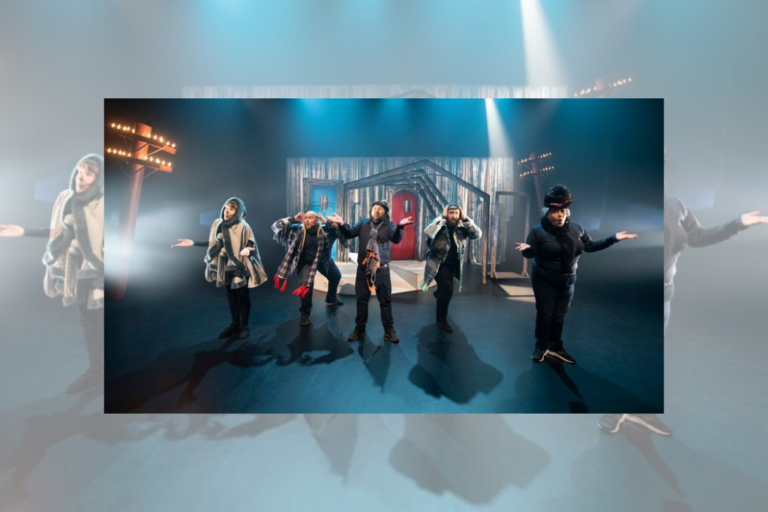REVIEW: asses.masses is an endurance performance that takes boredom as its subject
Many theatrical experiences engage with the audience — being pulled onstage at a pantomime, improv shows, Shakespearean soliloquies, etc. — and mine this meta-awareness for humour or pathos.
But a couple of hours into asses.masses‘s marathon runtime, it occured to me that the audience isn’t just the show itself (that’s evident from the start), but that we might also be test subjects in an anthropological study of what an audience can endure.
asses.masses — a long-running project by Patrick Blenkarn, Milton Lim, and Laurel Green, this iteration made in collaboration with The Theatre Centre — is seven hours long, a fact that initially repelled, then compelled me. I wasn’t drawn to the project as a gamer, but as someone who likes to linger for hours watching video installations, and who recently sat through two four-hour films in one week. I asked at the box office if people were able to leave and come back, as you can do with other endurance theatre pieces. She told me leaving was discouraged, but added that they couldn’t stop us from doing so.
With this slightly ominous comment, I filed into the theatre with the buzzing audience. I ran into a friend, and we both marvelled at what we were about to do. I was also relieved to have someone to experience this with. In the show’s parlance, I had briefly found a comrade (although she had to leave about two hours in). I knew the performance was an interactive video game which follows a group of donkeys who have lost their jobs because the local mine replaced them with machines, but the introduction with some of the show’s creators includes no further instructions. Soon the lights go dark, and a spotlight shines on a video game controller sitting on a podium. There’s a giddy hush in the room, and quickly an audience member walks up to the podium. The room explodes with cheers, like a dear friend was heading up to accept an award. We are immediately hooked.
For an interactive performance piece, it’s quite remarkable how quickly the audience settled into the unconventional rhythms of the show. As questions and options flashed on the screen, audience members shout suggestions (I say shout, but I actually mean scream) and the player at the controller gauges (from volume or vehemence) what they think the audience wishes to choose. It’s the ingenious trick of the show: in order to watch a narrative about solidarity among workers, we have to work together. The opening episodes of the performance follow the group of donkeys as they organize a protest in the village to get their jobs back, but morale is lagging and unexpected hurdles greet them at nearly every turn. We quickly get a sense of the donkeys’ dynamics, traditions, and affections, and I found myself emotionally invested — and it seems the audience did too. When the game claimed its first casualty of many, the person next to me gasped, their partner clutching their shoulder. When a donkey dies, they are reborn in an astral plane, where the 2D animation gives way to trippy, quite beautiful, three-dimensional graphics, and they are welcomed into the afterlife with a donkey spirit orgy (which is represented by a challenging Garage Band-esque game… it makes perfect sense in context).
The video game itself is an awe-inspiring undertaking from the creators, and I haven’t seen all of it (the game will be different depending on specific audiences’ decisions). The credits for the show are fascinating themselves, with many of the creators taking on a variety of roles (for example, Lim is credited with co-direction, sound design, shaders, video, 3D visual effects and text; on the night I attended, he also had the job of fixing the controller the two times it stopped working).
In the first few hours, the game’s blend of experimentation, bawdy humour, world-building, and audience collectivity is thrilling. Somehow, the experience of watching someone play a video game is emotionally powerful. But three or four hours in, as the game became a bit more monotonous, I was reminded of the times in my life when I actually watched someone play video games, that hypnotic feeling of boredom with an edge of gender resentment (I had no natural aptitude for games and no tolerance for being bad at something). In one of the later episodes, the captured donkeys have to escape a slaughterhouse. It was at once harrowing and mind-numbing — the excitement of watching the group collectively problem-solve had given way to tiredness and tedium.
But tediousness is also the point. In the game, the donkeys pass a billboard that exclaims, “Boredom sets you free.” And so as my eyes pricked and my own ass hurt from the hard chairs, I had to reframe my encroaching irritation.
Perhaps the most radical thing about the show is that the intermissions are indeterminate and the audience has to collectively decide when to start again, which means the second break stretched to nearly an hour. I eventually went back to my seat, hoping that would encourage others to do the same, but clearly, I do not have the bearing of a leader.
The show cleverly probes our sense of self within a collective and individually. Before the donkey narrative begins, the audience is asked a series of questions about their values, their living conditions, and their work lives. My friend mentioned that she should not have worked the day of the performance, because the show itself was a shift’s length. By the sixth or seventh hour, I indeed felt like a worker at the factory of cultural production. I began to ask myself if the demands of the job were too high, if the compensation was fair, and if I felt fulfilled or alienated from working for the proverbial man. I left the theatre feeling a bit like I do at the end of a workday: tired and overstimulated, but exhilarated by my hard-earned freedom.
asses.masses ran at The Theatre Centre until September 24. You can learn more about the production here.
Intermission reviews are independent and unrelated to Intermission’s partnered content. Learn more about Intermission’s partnership model here.















Comments